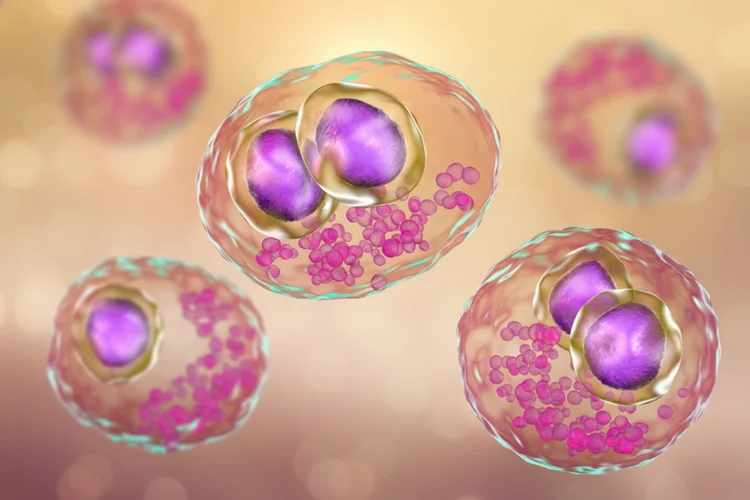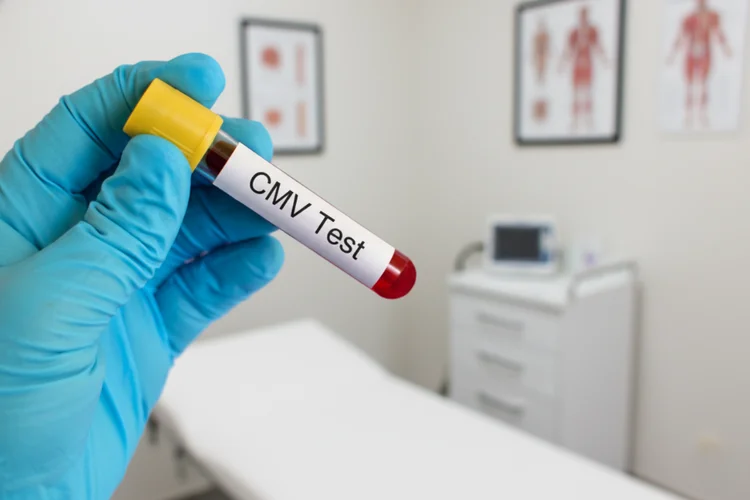Cytomegalovirus (CMV): Symptoms, Risks, and Testing
| Test Options |
|
| Treatment | Oral antibiotics |
| Price |
|
| Appointment Options |
Same-day appointment (subject to availability). Book via WhatsApp: 8893 3757 or email: hello@healthscreening.sg |
| Clinic Locations |
Orchard: 1 Orchard Blvd
#05-09 Camden Medical Centre, S248649 Tanjong Pagar: 72 Anson Rd #01-02 Anson House, S079911 |
What Is Cytomegalovirus (CMV)?
Cytomegalovirus (CMV) is a common virus belonging to the herpesvirus family that can
remain dormant in the body long after the initial infection. Once infected, most people
experience no noticeable illness or only mild, flu-like symptoms, such as fatigue or fever.
However, the virus can become problematic in certain groups, particularly individuals with
weakened immune systems, pregnant women, and infants. In these cases, CMV may lead to
more serious complications affecting different organs or developmental outcomes.

How Does Cytomegalovirus (CMV) Spread?
Cytomegalovirus spreads through close contact with bodily fluids, including saliva, urine,
blood, semen, vaginal secretions, and breast milk. Transmission generally requires
prolonged or repeated exposure, as the virus is not airborne.
Common routes of infection include:
- Exposure to the saliva or urine of young children
- Sharing utensils, drinks, or kissing someone carrying the virus
- Sexual activity involving contact with infected fluids
- Mother-to-child transmission during pregnancy, delivery, or breastfeeding
- Blood transfusions or organ transplants from infected donors
Although CMV can be transmitted through sexual contact, it is not classified as a sexually transmitted infection (STI).
What Are Symptoms of Cytomegalovirus (CMV)?
CMV often causes no noticeable illness in healthy individuals, but when symptoms
appear,
they usually resemble a mild viral infection. The type and severity of symptoms
depend on
the person's immune response and overall health.
Common symptoms are generally self-limiting and may resolve within a
few weeks. These may include:
- Persistent fatigue or tiredness
- Low-grade fever or chills
- Muscle or body aches
- Sore throat
- Swollen lymph nodes

What Are Complications of Cytomegalovirus (CMV)?
Complications from CMV are most likely to develop in individuals with compromised immune systems and in infants born with congenital CMV infection. In immunocompromised individuals, CMV may lead to:
- Retinitis, which can result in vision loss or blindness
- Pneumonia or lung inflammation
- Hepatitis (liver inflammation)
- Inflammation of the digestive tract, including ulcers or colitis
- Neurological problems such as seizures or cognitive decline
- Multi-organ issues affecting vital systems like the liver, lungs, or brain
In newborns with congenital CMV, potential complications may include:
- Hearing loss
- Developmental or learning delays
- Microcephaly (smaller than average head size)
- Poor growth or failure to thrive
- Vision impairment
- Seizures
How Is Cytomegalovirus Diagnosed?
Diagnosis of CMV relies on laboratory testing of fluids or tissues to confirm the presence of the virus. Common tests include:
- Polymerase Chain Reaction (PCR) testing to identify CMV DNA in blood, urine, or saliva. This method is particularly useful in detecting congenital or active infections in immunocompromised individuals.
- Serological testing to measure CMV-specific antibodies (IgM and IgG) in the blood, which helps determine whether the infection is recent or occurred in the past.
- Tissue biopsy when CMV-related disease is suspected in organs such as the liver, lungs, or gastrointestinal tract.
Routine CMV screening is not standard for healthy individuals. However, testing may be recommended during pregnancy, prior to organ transplantation, or for those with weakened immune systems to assess infection risk or activity.

How Is Cytomegalovirus Treated and Managed?
There is no permanent cure for CMV, but in most healthy individuals, treatment is unnecessary as the infection resolves naturally. Management strategies focus on controlling symptoms and preventing complications in vulnerable patients.
- Observation only is sufficient for mild or symptom-free cases.
- Antiviral therapy using medications such as ganciclovir, valganciclovir, foscarnet, or cidofovir may be indicated for severe infections or immunocompromised individuals.
- Supportive care, including adequate hydration and rest, helps relieve symptoms during recovery.
Treatment is typically guided by specialist assessment, particularly in cases involving organ transplant recipients or individuals with advanced immune suppression. Regular monitoring helps ensure early detection of any reactivation or complications.
How Much Does Cytomegalovirus (CMV) Testing Cost?
At healthscreening.sg, CMV testing is available as a standalone blood test or as part of our genital ulcer screening packages.
| Test / Treatment | Test Type | Price* |
|---|---|---|
| Consultation | From $49.05 | |
| Testing | ||
| Cytomegalovirus IgM Antibody Test | Blood | $80.66 |
| Cytomegalovirus IgG Antibody Test | Blood | $80.66 |
|
Genital Ulcer PCR Testing (7 tests) Herpes Simplex Virus 1 and 2, Haemophilus Ducreyi (Chancroid), Cytomegalovirus, Lymphogranuloma, Venereum, Treponema Pallidum (Syphilis), Varicella Zoster Virus |
Swab | $318 |
|
Enhanced Genital Ulcer Testing (18 tests) HIV, Syphilis (swab + blood test), Hepatitis B, Hepatitis C, Chlamydia, Gonorrhoea, Mycoplasma genitalium, Mycoplasma hominis, Trichomonas, Ureaplasma parvum, Ureaplasma urealyticum, Herpes Simplex Virus 1 and 2, Haemophilus Ducreyi (Chancroid), Cytomegalovirus, Lymphogranuloma, Venereum, Treponema Pallidum (Syphilis), Varicella Zoster Virus |
Blood + Swab | $538 |
*Prices are NETT and inclusive of GST.
^Prices last updated on
Jan 28, 2026. While every effort is made to keep pricing information up to date, please contact our team to confirm the latest rates.
We also offer confidential and discreet STI
testing, with treatment options available if required. Both male and female doctors are available
upon request, subject to availability, to ensure your comfort.
For information on available tests, or to arrange an appointment, please contact us.
How to Book an Appointment for Cytomegalovirus Testing?
Why Choose Us?








Navigate Easy With Google Maps
Health Screening Singapore (Anson House)
Nearest MRT: EW15 Tanjong PagarHealth Screening Singapore (Camden Medical Centre)
Nearest MRT: TE13 Orchard BoulevardHealth Screening Singapore (CPF Jurong Building)
Nearest MRT: NS1/EW24 Jurong EastFrequently Asked Questions (FAQ)
Cytomegalovirus (CMV) spreads through direct contact with bodily fluids such as saliva, urine, blood, semen, vaginal secretions, and breast milk. The virus is not airborne and cannot be caught by casual contact or breathing the same air as an infected person. Transmission usually requires prolonged or repeated exposure, for example through close contact, sexual activity, or from mother to baby during pregnancy or breastfeeding.
CMV is not highly contagious and generally requires close contact for transmission. Most healthy individuals who contract the virus experience no symptoms or only mild illness. However, people with weakened immune systems, organ transplant recipients, pregnant women, and newborns are at higher risk of developing serious complications. Good hygiene and avoiding direct contact with saliva or urine can help reduce transmission risk.
In most healthy individuals, CMV infection is mild or asymptomatic and resolves without treatment. However, it can cause serious illness in people with compromised immune systems and in babies infected before birth. Complications may include lung, liver, or eye inflammation, and in newborns, developmental or hearing problems.
When a baby is infected with CMV before birth, the virus may affect hearing, vision, growth, and brain development. Some babies show no symptoms at birth but may develop hearing loss or developmental delays later in life. Early detection and medical monitoring can help manage potential complications. It is advisable to discuss CMV testing and preventive measures with your obstetrician during pregnancy.
Early signs of CMV infection often resemble those of a mild flu-like illness. Common symptoms include fatigue, low-grade fever, muscle aches, sore throat, and swollen lymph nodes. These usually resolve within a few weeks without specific treatment. However, if symptoms persist or you belong to a higher-risk group, such as those who are pregnant or immunocompromised, it is advisable to seek medical evaluation for appropriate testing and management.
Being CMV positive means that cytomegalovirus has been detected in your body, either from a recent or past infection. Blood tests can differentiate between these by measuring CMV antibodies, where IgM suggests a recent infection and IgG indicates past exposure. In most healthy individuals, the virus remains dormant without causing illness, but it may reactivate in those with weakened immunity or during pregnancy. It is best to consult your doctor for appropriate follow-up.
There is no cure for CMV, but treatment is available to manage active infections and prevent complications in at-risk individuals. Most healthy people recover without medical intervention, while those with severe or persistent infections may be prescribed antiviral medications such as ganciclovir or valganciclovir. The goal of treatment is to control viral activity and reduce the risk of organ or developmental damage.
CMV can be prevented by practising good hygiene and avoiding contact with infected bodily fluids. Washing hands frequently, especially after contact with children’s saliva or urine, not sharing utensils or drinks, and practising safer sex can reduce risk. Pregnant individuals and those with weakened immune systems should take extra precautions and avoid exposure to potentially infected materials.
Cytomegalovirus (CMV) can be transmitted through sexual contact involving exposure to infected bodily fluids, but it is not classified as a sexually transmitted infection (STI). The virus spreads more commonly through close contact with saliva, urine, or breast milk. Because CMV is widespread and can be passed in non-sexual ways, practising good hygiene and safer sex can help reduce transmission.
CMV is different from both human papillomavirus (HPV) and hepatitis viruses. CMV is a herpesvirus that can remain dormant and reactivate, while HPV primarily affects the skin and genital tract, and hepatitis viruses target the liver. Although these infections may sometimes share transmission routes, they cause distinct diseases and require different testing and management.
Hearing loss is the most common complication of congenital cytomegalovirus (CMV). Some affected infants may also experience developmental delays, vision problems, or growth issues. Hearing loss can occur at birth or develop later in childhood, even in babies who initially show no symptoms.
Cytomegalovirus can cause mild, flu-like symptoms in healthy individuals but may lead to serious complications in people with weakened immunity or in newborns. Long-term effects can include vision or hearing loss, liver inflammation, and neurological problems if the infection affects vital organs. In congenital cases, developmental delays and growth issues may occur.
Cytomegalovirus infects and enlarges body cells, altering their structure and function. It can remain dormant within these cells and reactivate when the immune system is weakened. In active infection, CMV may damage tissues in the eyes, liver, lungs, or brain, depending on where the virus replicates. This cellular disruption contributes to the organ-specific complications seen in severe or congenital CMV infections.
